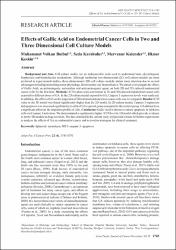Effects of gallic acid on endometrial cancer cells in two and three dimensional cell culture models
Künye
Bülbül, M. V., Karabulut, S., Kalender, M. ve Keskin, İ. (2021). Effects of gallic acid on endometrial cancer cells in two and three dimensional cell culture models. Asian Pacific Journal of Cancer Prevention, 22(6), 1745-1751. https://dx.doi.org/10.31557/APJCP.2021.22.6.1745Özet
Background and Aim: Cell culture studies are an indispensable tools used to understand basic physiological, biophysical and biomolecular mechanisms. Although traditional two-dimensional (2D) cell culture models are more preferred in experimental studies, three-dimensional (3D) cell culture models, attract more attention due to several advantages including mimicking tumor physiology, biochemistry and biomechanics. We aimed to investigate the effects of Gallic Acid, an antimutagenic, antioxidant and anticarcinogenic agent, on both 2D and 3D cultured endometrial cancer cells for the first time. Methods: IC50 values were determined in 2D and 3D cultured endometrial cancer cells exposed to different doses of GA. In the 2D culture model exposed to GA, Caspase 3 expression levels were analyzed. In addition, the effect of GA on the migration of 2D cultured endometrium cancer cells was investigated. Results: IC50 value in the 3D model was found significantly higher than the 2D model. In 2D culture model, Caspase 3 expression and apoptosis was increased significantly in cells of GA exposed group compared to the control group. GA did not have a significant effect on the migration profile of cells. Conclusion: Gallic Acid is shown to induce apoptosis in Ishikawa cells via Caspase 3 activation. We demonstrated a significantly higher IC50 level in 3D model which provide evidence to prefer 3D models in drug-test trials. The data obtained in the current study will provide a basis for further experiments to analyze the effects of GA on endometrial cancer and to develop strategies for clinical treatment.
Scopus Q Kategorisi
Q3Kaynak
Asian Pacific Journal of Cancer PreventionCilt
22Sayı
6Koleksiyonlar
- Makale Koleksiyonu [3751]
- Makale Koleksiyonu [178]
- PubMed İndeksli Yayınlar Koleksiyonu [4203]
- Scopus İndeksli Yayınlar Koleksiyonu [6522]


















